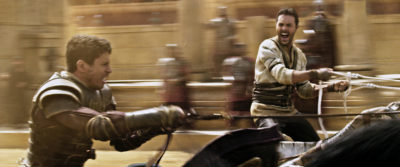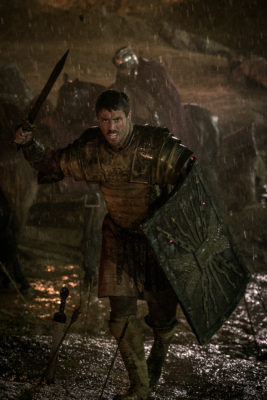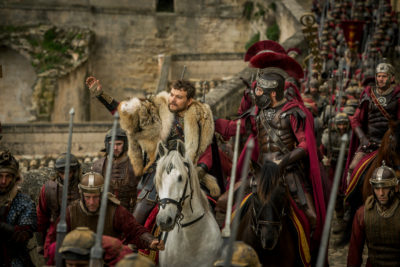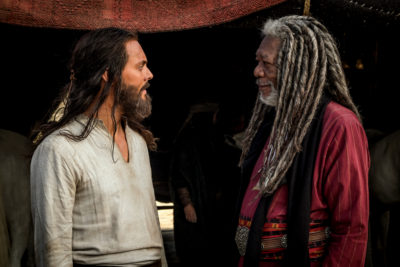
Toby Kebbell plays Messala Severus and Jack Huston plays Judah Ben-Hur in Ben-Hur from Paramount Pictures and Metro-Goldwyn-Mayer Pictures.
I went in to the advance screening of Ben-Hur expecting a disaster. While the trailers weren’t brilliant, they showed both some promise and the possibility of a total bleep-up.
Instead, it was neither the film of that promise nor the Golden Raspberry contender it could have been.
It was a technically proficient film that had some decent performances and some good ideas, but it left me curiously unmoved.
Ben-Hur is the story of two brothers – Judah Ben-Hur (Jack Huston, Boardwalk Empire) and Messala Severus (Toby Kebbell, Warcraft), who was adopted – who loved each other and were intensely competitive at the same time.
We see both aspects of the brothers as they race on what looks like a grassy plain – until Judah’s horse stumbles over a hole and he’s badly injured. Messala carries him home on his back.
The first act of Ben-Hur introduces the brothers and their family – royalty in Jerusalem – before giving Messala a reason to leave home and join the Roman legions.

Toby Kebbell plays Messala in Ben-Hur from Paramount Pictures and Metro-Goldwyn-Mayer Pictures.
The first act has a few good ideas that no other version of the story has – we meet Jesus Christ (Rodrigo Santoro, The 33) early on: first working as a carpenter and a man who has a unique approach to life, and then again later when he shows kindness to Judah.
While Messala is helping Roman expand and consolidate its empire, Judah is striving to keep the peace between the Romans and the Jews – though a small group of zealots make it difficult.
When Messala returns – to pave the way for Pontius Pilate (Pilou Asbæk), accompanied by a full legion, to pass through the city without incident – things go awry and Judah is arrested and his family killed. He spends five years as a galley slave, pulling an oar for a Roman ship (in a cool storytelling device, while he’s on the ship, we only see the world as he sees it – through the hole through the oars extend).
When the Greek navy routes the Romans, Judah alone survives, washes up on a beach and meets Ilderim (Morgan Freeman), a nomadic gambler who bets on chariot races (where his team of four beautiful white horses is usually successful).
He teaches Judah how to race and that sets up the climactic chariot race that is the big turning point of the film.

Pilou Asbaek plays Pontius Pilate and Toby Kebbell plays Messala Severus in Ben-Hur from Metro-Goldwyn-Mayer Pictures and Paramount Pictures.
Bekmambetov (Night Watch, Wanted) takes the script – by Keith R. Clarke (The Way Back) and John Ridley (12 Years a Slave, American Crime) – takes a few risks: he lingers perhaps a bit too long on establishing the Judah/Messala relationship, but makes Christ’s early appearances feel right; his battle sequences shed plenty of light on what Messala went through before returning home, but they aren’t the entirely bloodless battles we’ve seen before, and then there’s the chariot race…
If you go online, you can quickly learn that the chariot race was shot in camera – no CGI on the actual race (though undoubtedly some on the crowd and circus in which it takes place).
And here is where the intriguing changes from earlier in the movie are balanced out by a poor decision: there’s only one five second cut in the entire chariot race sequence – and it’s of Pilate standing up and urging Messala on.
The rest of the race is chopped up into two-to-four second cuts. That renders the in camera shoot utterly useless – and makes the race harder to follow (especially in bone-rattling 3D!).
Bekmambetov’s Ben-Hur is significantly shorter than the 1959 classic (124 minutes – 212 minutes), but for all his film is more efficient at telling the story, it loses something, too. There are too many places where something happens that seems unconnected to the rest of the film (one example – Judah’s wife visits him in Ilderim’s camp out of nowhere; there’s some connecting shots that were edited out for brevity, but it’s still a jarring moment).

Jack Huston plays Judah Ben-Hur and Morgan Freeman plays Ilderim in Ben-Hur from Metro-Goldwyn-Mayer Pictures and Paramount Pictures.
While the cast perform admirably, Huston looks far too little to survive his stint on that galley – or to be pulling off the chariot race.
I’m sure you’ll read dozens of reviews elsewhere that will rail on and on about how Timur Bekmambetov’s Ben-Hur doesn’t measure up to the 1959 version that starred Charlton Heston.
As someone who fondly remembers that film (and the eleven Oscars® it won), I can understand that kind of comparison. But here’s the thing – whether they’re right or wrong, they’re probably unduly harsh because it seems an exercise in futility to have even tried to reimagine the story from Lew Wallace’s novel since the 1959 film is one of the greatest films ever made.
They’re not completely wrong but they’re not completely right, either.
Between the intriguing moments and the flubbed ones, Ben-Hur comes out as something that’s possibly worse than a disaster – an average film that occupies two hours of one’s life without sparking any real emotional response – positive or negative.
Final Grade: C